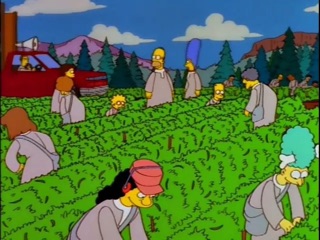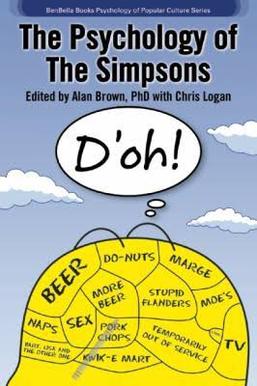
Homer Jay Simpson is the protagonist of the American animated sitcom The Simpsons. He is voiced by Dan Castellaneta and first appeared, along with the rest of the Simpsons, in The Tracey Ullman Show short "Good Night" on April 19, 1987. Homer was created by the cartoonist Matt Groening while he was waiting in the lobby of producer James L. Brooks's office. Groening had been called to pitch a series of shorts based on his comic strip Life in Hell but instead created a new set of characters. He named the character after his father, Homer Groening. After appearing for three seasons on The Tracey Ullman Show, the Simpsons received their own series on Fox, which debuted on December 17, 1989.

"The Joy of Sect" is the thirteenth episode of the ninth season of the American animated television series The Simpsons. It originally aired on Fox in the United States on February 8, 1998. In the episode, a cult takes over Springfield, and the Simpson family become members.

"Lisa the Skeptic" is the ninth episode of the ninth season of the American animated television series The Simpsons. It first aired on Fox in the United States on November 23, 1997. On an archaeological dig with her class, Lisa discovers a skeleton that resembles an angel. All of the townspeople believe that the skeleton actually came from an angel, but skeptical Lisa attempts to persuade them that there must be a rational scientific explanation. The episode's writer, David X. Cohen, developed the idea after visiting the American Museum of Natural History, and decided to loosely parallel themes from the Scopes Monkey Trial. The episode also makes allusions to actual hoaxes, such as the Cardiff Giant.
"They Saved Lisa's Brain" is the twenty-second and penultimate episode of the tenth season of the American animated television series The Simpsons. It first aired on Fox in the United States on May 9, 1999. In the episode, after writing a thoughtful letter to the Springfield Shopper, Lisa is invited to join the Springfield chapter of Mensa. When Mayor Quimby later flees Springfield, the group takes control of the town, hoping to improve the lives of Springfieldians through the rule of the smartest. Meanwhile, Homer poses for a series of erotic photos.
"Realty Bites" is the ninth episode of the ninth season of the American animated television series The Simpsons. It originally aired on Fox in the United States on December 7, 1997. The episode sees Marge becoming a real estate agent, while Homer enjoys Snake's car. It was written by Dan Greaney and directed by Swinton O. Scott III.

"Deep Space Homer" is the fifteenth episode of the fifth season of American animated television series The Simpsons, which was first broadcast on Fox in the United States on February 24, 1994. In the episode, NASA selects Homer Simpson to participate in a spaceflight to spark public interest in space exploration and boost low ratings of the launches. Once in space, his incompetence destroys the navigation system on board the Space Shuttle.
"Lost Our Lisa" is the twenty-fourth and penultimate episode of the ninth season of the American animated television series The Simpsons. It originally aired on Fox in the United States on May 10, 1998. The episode contains the last appearance of the character Lionel Hutz. When Lisa learns that Marge cannot give her a ride to the museum and forbids her to take the bus, she tricks Homer into giving her permission. After Lisa gets lost, Homer goes looking for her and the two end up visiting the museum together.
"The Last Temptation of Krust" is the fifteenth episode of the ninth season of the American animated television series The Simpsons. It first aired on Fox in the United States on February 22, 1998. It was written by Donick Cary and directed by Mike B. Anderson. Comedian Jay Leno makes a guest appearance. In the episode, Bart convinces Krusty the Clown to appear at a comedy festival organized by Jay Leno, but Krusty's old material does not go over well with the audience and he receives bad reviews. He briefly retires from comedy but returns with a new, better-received gimmick. He soon returns to his old ways, selling out to a motor-vehicle company.

"Lisa vs. Malibu Stacy" is the fourteenth episode of the fifth season of the American animated television series The Simpsons, and the 95th episode overall. It originally aired on the Fox network in the United States on February 17, 1994. Lisa challenges the Malibu Stacy dollmakers to make a less sexist doll. With Malibu Stacy's original creator, Stacy Lovell, Lisa creates the doll Lisa Lionheart to positively influence young girls.
"Marge in Chains" is the twenty-first and penultimate episode of the fourth season of the American animated television series The Simpsons. It originally aired on Fox in the United States on May 6, 1993. In the episode, Marge is arrested for shoplifting after forgetting to pay for an item at the Kwik-E-Mart. The family hires attorney Lionel Hutz to defend her at trial, but she is found guilty and sentenced to 30 days in prison. Homer and the rest of the family have trouble coping without Marge.

"Homer vs. Patty and Selma" is the seventeenth episode of the sixth season of the American animated television series The Simpsons. It originally aired on Fox in the United States on February 26, 1995. In the episode, Homer loses all his money in pumpkin futures and must turn to Patty and Selma for a loan. Meanwhile, Bart takes up ballet lessons, with an instructor voiced by actress Susan Sarandon.
"The PTA Disbands" is the twenty-first episode of the sixth season of the American animated television series, The Simpsons. It originally aired on Fox in the United States on April 16, 1995. In the episode, Bart Simpson manipulates Edna Krabappel into organizing a strike of Springfield Elementary's teachers union to protest Principal Skinner's miserly school spending.
"The Springfield Connection" is the twenty-third episode of the sixth season of the American animated television series The Simpsons. It originally aired on Fox in the United States on May 7, 1995. In the episode, Marge deals with corruption and crime when she joins the Springfield police force.
"Brother from the Same Planet" is the fourteenth episode of the fourth season of the American animated television series The Simpsons. It first aired on Fox in the United States on February 4, 1993. In the episode, Bart, furious with Homer for taking too long to pick him up from soccer practice on a rainy day, turns to the Bigger Brothers Agency, which pairs up fatherless boys with adult male role models. Meanwhile, Lisa becomes addicted to the Corey hotline, a phone service where television fans can listen to the voice of a teen idol.
"'No Exit" is the seventh episode of the first season of the American police procedural television series Miami Vice. It premiered on the National Broadcasting Company (NBC) on November 9, 1984. The episode was written by Charles R. Leinenweber and Maurice Hurley, and directed by David Soul. "No Exit" featured guest appearances by Bruce Willis, Katherine Borowitz and Vinnie Curto.

The Psychology of The Simpsons: D'oh! is a non-fiction book analyzing psychology themes in the television series The Simpsons. It contains content from several contributors, including psychologists, counselors and school therapists. The book was edited by Alan S. Brown, Ph.D., and Chris Logan, and was published on March 1, 2006, by BenBella Books. It has praise from reviewers.

Gary William Chartier is a legal scholar, philosopher, political theorist, and theologian. His work addresses anarchism and ethics. Chartier is a professor and serves as associate dean of La Sierra University's business school.
William Irwin is Professor of Philosophy at King's College in Wilkes-Barre, Pennsylvania and is best known for originating the "philosophy and popular culture" book genre with Seinfeld and Philosophy: A Book about Everything and Nothing in 1999 and The Simpsons and Philosophy: The D'oh! of Homer in 2001.
"The D'oh-cial Network" is the eleventh episode of the twenty-third season of the American animated television series The Simpsons. It originally aired on the Fox network in the United States on January 15, 2012. In the episode, Lisa is sad that she has no real friends. She discovers that it is easier to make friends on the Internet and therefore creates a social networking website called SpringFace. It becomes incredibly popular in Springfield and Lisa gets many online friends. However, they still ignore her in real life, and the website starts to cause trouble in the town when people use it while driving and cause accidents. Lisa is put on trial and the court orders her to close down SpringFace.
Bibliography of works on The Simpsons is a list of works about the American multimedia franchise The Simpsons, its themes, and its cultural influence.








